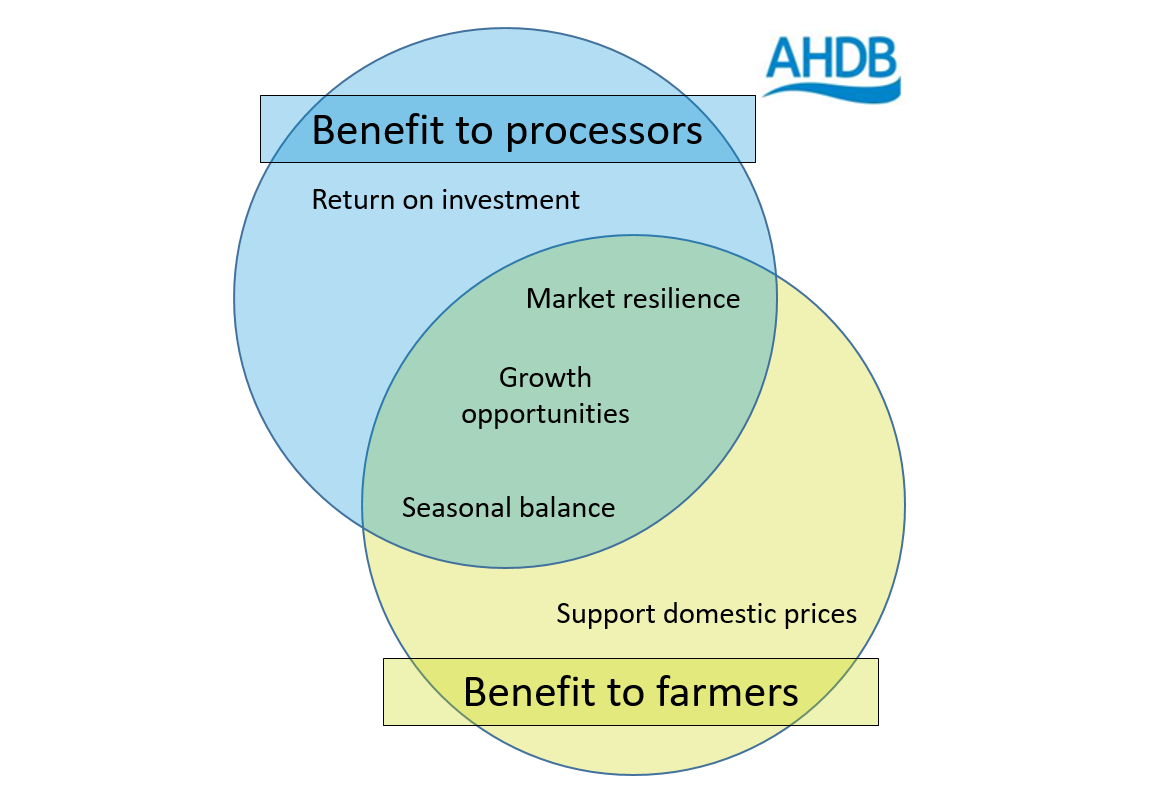How do dairy farmers benefit from increased exports?
Thursday, 30 September 2021
By Chris Gooderham
Globally, demand for dairy continues to grow, and many businesses in the UK have developed long-term export strategies to increase their share of this growing market. The NFU recently released its report “The case for growing our dairy exports” with the ambition of doubling the value of British dairy exports over the next ten years.
However, one question that we keep getting asked is, how do dairy farmers benefit from increased exports? Here we try to explain the economics.
Supply versus demand
First, let us look at the fundamental drivers within the UK. Our long-term expectation is that milk production in the UK will rise over the next ten years, and that we will see a bigger proportion of it turned into tradable products like cheddar and mozzarella.
Consumption habits in the UK have been changing. While consumption per capita of milk is expected to continue to fall slowly, this is more than offset by increased consumption of butter, cheese and yogurt.
Despite this continual increase in overall consumption, our expectation is that milk production will rise more rapidly. The current pressures on margins from rapidly increasing input costs, may delay that expansion, but our long-term expectation remains unaltered.
With production expected to rise quicker than consumption in our home market, if we do nothing then an imbalance will develop between supply and demand, and dairy prices in the country will fall. To avoid this, we need to find a market for the extra milk. Given that the UK is not self-sufficient in dairy products, this could be done by either displacing imports or growing exports.
The choice between the two depends on a number of factors, but really comes down to the margins that can be made and how easy it is to access the market.
As well as dealing with additional milk, businesses export in order to achieve a higher return for their products than could be achieved domestically. This can often require product development work, to produce the niche product that a particular market is willing to pay a premium for. Under such circumstances, the higher margin is the return to the company for their investment in product development and marketing. That means it will not necessarily flow through to the price paid for the milk. In a farmers’ co-op however, the additional profit margin generated would typically go into the mix to determine the price that can be paid to the farmer members, or may be paid in the form of a 13th payment.

The benefit to farmers
With global consumption of dairy products continuing to grow, there is a great opportunity for the British dairy industry to benefit from accessing those markets.
In general, the company that invests in new products for export markets will gain the benefit of that investment. However, there is a knock-on positive impact on domestic prices. Firstly, by increasing overall demand for milk and secondly by achieving a higher return for some of that milk.
In an open economy such as the UK, where there are few barriers to imports, UK prices will remain in line with global prices. However, the option to divert milk into the highest value market will help to ensure UK milk obtains the best possible return.
Exporting can also be used to balance supply against domestic consumption. The profile of British milk production is amongst the flattest in world, but we still have a spring peak where more milk is produced on farm than is required for the domestic market. Export markets can be used to complement domestic demand to help manage that peak.
Finally, accessing a diverse range of markets brings resilience against market volatility, especially with premium, niche, products that normally show more price stability.

Subscribe to our Dairy Market Weekly newsletter and receive market updates in your inbox every Thursday
Sign up to receive the latest information from AHDB.
While AHDB seeks to ensure that the information contained on this webpage is accurate at the time of publication, no warranty is given in respect of the information and data provided. You are responsible for how you use the information. To the maximum extent permitted by law, AHDB accepts no liability for loss, damage or injury howsoever caused or suffered (including that caused by negligence) directly or indirectly in relation to the information or data provided in this publication.
All intellectual property rights in the information and data on this webpage belong to or are licensed by AHDB. You are authorised to use such information for your internal business purposes only and you must not provide this information to any other third parties, including further publication of the information, or for commercial gain in any way whatsoever without the prior written permission of AHDB for each third party disclosure, publication or commercial arrangement. For more information, please see our Terms of Use and Privacy Notice or contact the Director of Corporate Affairs at info@ahdb.org.uk © Agriculture and Horticulture Development Board. All rights reserved.

